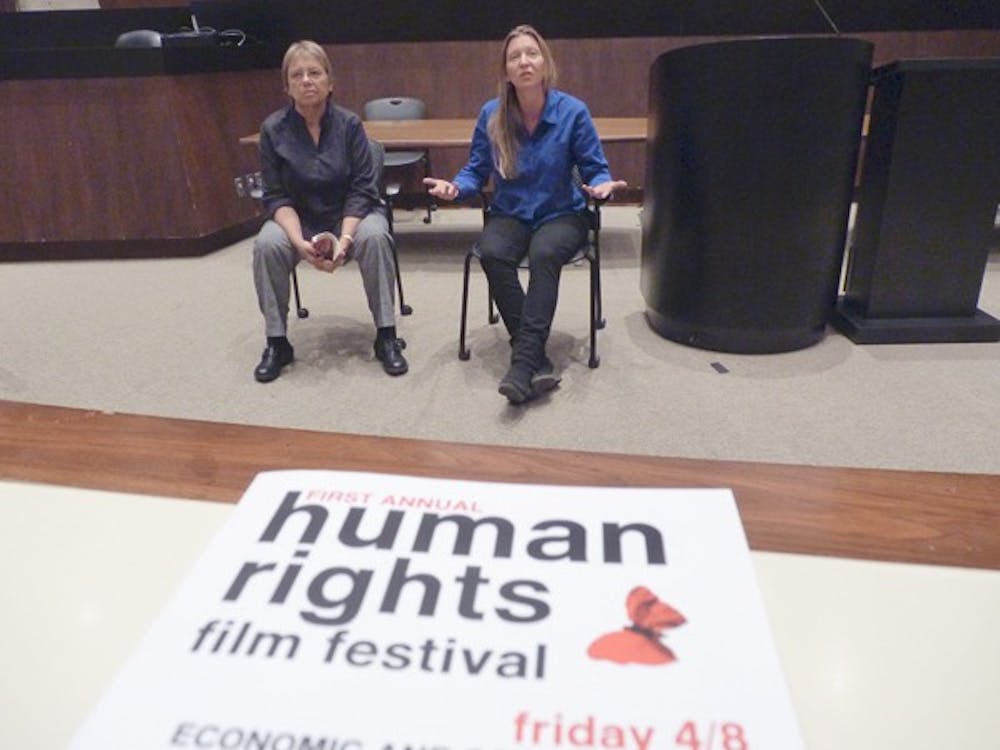About 120 students, faculty and community members gathered Friday to kick off the first night of ASU’s inaugural Human Rights Film Festival with the movie “The Economics of Happiness.”
The film festival, co-sponsored by Human Rights at ASU, the School of Social Transformation and Barrett, the Honors College, covered a multitude of topics from migrant rights to prisoners’ rights to indigenous rights.
Helena Norberg-Hodge, Steven Gorelick and John Page directed “The Economics of Happiness,” which discussed the effects of globalization on communities and emphasized the localization of businesses and communities for a greater quality of life.
“[The film makers are] not asking everybody to go back to farming and for everybody to stay poor, but asking us to take a real look at what creates happiness,” said LaDawn Haglund, assistant professor of justice and social inquiry in the School of Social Transformation.
However, one person in the audience said many people cannot afford to buy locally when the food produced in the global exchange is so much cheaper. For example, $2 china-produced salsa at Wal-Mart is more attractive and economically sound to some than homemade local $10 salsa at a farmers market, she said.
“It can’t be an overnight change because it is true that right now it’s a [economic] class issue … but we have policies that our government uses to support the Wal-Marts of the world and the other businesses that are linked to them,” Haglund said. “And so what the film, I think, is asking you to do is to support your government to stop the subsidies to the large businesses and support more local activities.”
Other films shown throughout the weekend included “COINTELPRO 101,” “The Response,” “Long Night’s Journey Into Day,” “The Snowbowl Effect” and an array of short films. The film festival was held Friday through Sunday on the Tempe campus.
The goal of the festival was to rally people around human rights, a subject Haglund said not a lot of people think about often.
Mary Margaret Fonow, the director of the School of Social Transformation and a professor in women and gender studies, said the intention of the film festival was “expanding the notion of human rights” and how to achieve them so that “people can realize well-being.”
Haglund and Fonow, who both spoke in the discussion after Friday’s film, said they were very pleased with the number of people who attended the film. So many people showed up that they had to move across the hall into a bigger room.
“Any time you have an opportunity to watch films and documentaries for free and then hear educated people speak about them, why wouldn’t I want to go?” sustainability sophomore Jessica Davenport said.
Davenport, who made the brochures for the event, said the topic of human rights interested her and applied to her minor in justice studies. She said she appreciated that the film focused not only on problems with globalization, but also offered solutions.
Fonow defined human rights as something beyond the basic right to bodily integrity and personal safety. She said in a society with so much wealth, human rights extend to the general wellbeing that yields good schools, adequate food and health care.
“Why, when there’s an abundance, should people suffer?” Fonow said.
She said ASU is making positive strides in the area of human rights.
“What I like about ASU in particular and what I think is unique about ASU is that it actually promotes change as a value,” Fonow said. “Rather than just identify all the problems, it focuses in on solution, innovation and how to make things better.”
Reach the reporter at hhuskins@asu.edu





